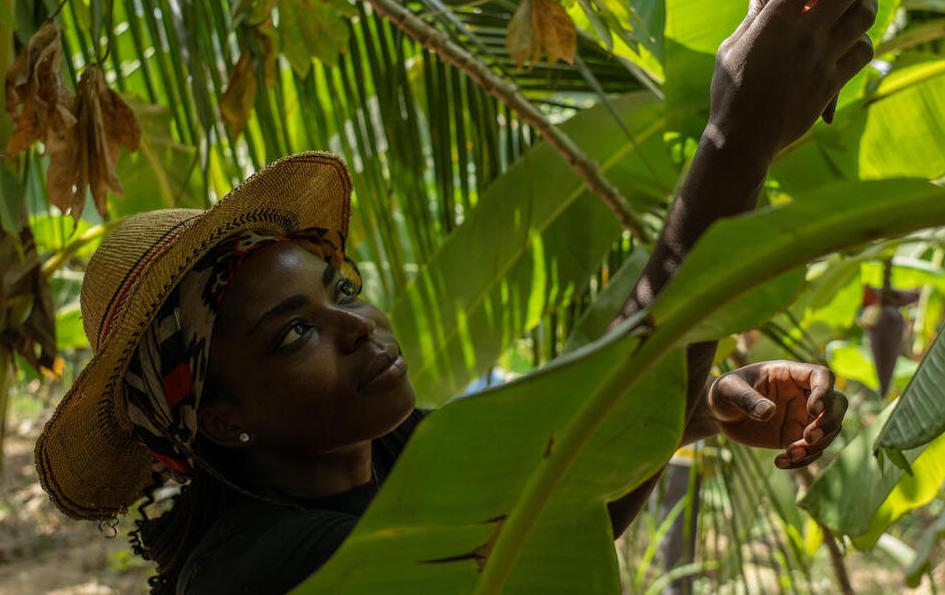Rome – Investing in gender equality and girls’s empowerment is just not solely extra pressing than ever but in addition an extremely good funding to generate financial development, meals safety, earnings alternatives and higher lives, notably in rural areas the place many of the world’s poorest stay. That would be the message tomorrow on Worldwide Girls’s Day from leaders on the Rome-based United Nations agriculture and meals companies occasion – Put money into Girls: speed up progress.
Closing gender gaps in farm productiveness and wages inside agrifood programs might enhance the worldwide home product by 1 %, representing almost US$1 trillion, and reduce international meals insecurity ranges, resulting in 45 million extra folks being food-secure, in accordance with the 2023 FAO standing of girls in agrifood programs report.
“Investing in girls means investing in sustainable improvement. The return on funding is not simply with the ability to beat poverty and inequality however constructing stronger establishments, economies and full communities,” mentioned Gerardine Mukeshimana, Vice-President of the Worldwide Fund for Agricultural Improvement (IFAD).
“Given girls’s essential function in rural economies and agrifood programs, notably in low- and middle-income international locations, addressing the gender hole in financing is important for extra inclusive and equitable rural improvement. Bridging this hole not solely empowers girls however can even have important advantages for his or her households and communities,” mentioned Maria Helena Semedo, Deputy Director-Common, Meals and Agriculture Group of the United Nations (FAO).
“Once we put money into girls and ladies, we nurture complete communities,” mentioned Valerie Guarnieri, World Meals Programme (WFP) Assistant Government Director, Programme Operations. “We are able to win the battle in opposition to starvation and malnutrition by empowering and supporting girls to take the lead.”
At the moment, solely 4 % of complete bilateral help is devoted to packages with gender equality because the principal goal, in accordance with the Organisation for Financial Cooperation and Improvement (OECD) 2022 Gender snapshot. Moreover, the present funding hole to attain gender equality in key areas, together with reaching the Sustainable Improvement Objectives to finish starvation and poverty and supporting equal participation of girls in societies by 2030, is about US$360 billion yearly in 48 growing international locations (FAO 2023).
Agrifood programs are an vital supply of earnings for ladies in lots of international locations. In Sub-Saharan Africa, for instance, 66 % of girls’s employment is in agrifood programs, and in southern Asia, it’s as a lot as 71 %. Girls are important to international, regional and nationwide meals safety (FAO 2023).
But, girls’s unequal standing, because of discriminatory social norms current in society and agrifood programs, leaves them weak to starvation and poverty. In 2022, 388 million girls and ladies lived in excessive poverty and 27.8 % of girls have been reasonably or severely meals insecure.
This total image of gender disparity is starkly evident in rural areas. Restricted entry to property and agricultural inputs generates a land productiveness gender hole, with a 24 % distinction between productiveness from feminine versus male-managed farms of the identical dimension. Girls earn, on common, 18.4 % much less in wage employment in agriculture: when males earn one greenback, girls earn about 82 cents. Additionally, heatwaves and floods have an effect on rural men and women in a different way and widen the earnings hole, as highlighted within the Unjust Local weather report (FAO 2024).
Rome-based UN agriculture and meals companies name for motion to deal with the gender hole
The Rome-based companies (RBAs) are calling for robust political dedication and elevated and accelerated investments in gender equality and girls’s empowerment to enhance meals safety and livelihoods and financial and social well-being for all.
The options lie in investing in girls’s and ladies’ capability by schooling, growing management expertise and by addressing discriminatory social norms that restrict their alternatives. Strengthening land rights for ladies can be important as is making certain girls’s equal entry to assets, together with monetary and extension providers, to bridge productiveness gaps.
In shut collaboration with IFAD and WFP, FAO plans to launch a significant international initiative to advance gender equality and girls’s empowerment on the 68th session of the Fee on the Standing of Girls, which can happen from 11 to 22 March 2024, harnessing the momentum generated by the Committee on World Meals Safety (CFS) “Voluntary Pointers on Gender Equality and Girls’s and Ladies’ Empowerment in Meals Safety and Vitamin” endorsed in 2023 and the 2023 FAO “Standing of girls in agrifood programs” report.
The RBAs are additionally spearheading gender-transformative approaches inside agricultural and rural improvement initiatives, difficult gender norms and practices, energy dynamics and decision-making processes by the Joint Programme on Gender Transformative Approaches for Meals Safety, Improved Vitamin and sustainable Agriculture. With UN Girls, the Rome-based companies are additionally implementing the Joint Programme on Rural Girls’s Financial Empowerment, a worldwide initiative to safe rural girls’s livelihoods, rights and resilience.
This total image of gender disparity is starkly evident in rural areas. Restricted entry to property and agricultural inputs generates a land productiveness gender hole, with a 24 % distinction between productiveness from feminine versus male-managed farms of the identical dimension. Girls earn, on common, 18.4 % much less in wage employment in agriculture: when males earn one greenback, girls earn about 82 cents. Additionally, heatwaves and floods have an effect on rural men and women in a different way and widen the earnings hole, as highlighted within the Unjust Local weather report (FAO 2024).




